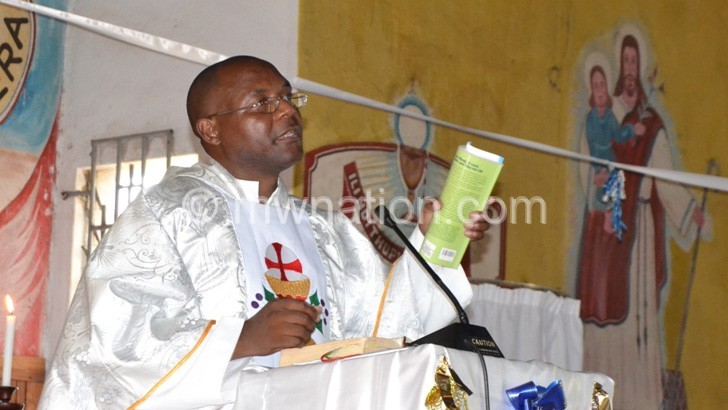On Jesus Christ’s birthday, salvation
Bishop Ian Nkhoma says the Lord Jesus Christ—whose birthday we just celebrated last Sunday—was not born on December 25.
Nkhoma believes Christ was born between September end or during the first days of October.
“A careful analysis of the Scripture indicates that December 25 could not be the actual date for Christ’s birth,” he wrote on his Facebook wall on December 18, seven days before the Christmas Day.
He advanced two reasons for his argument. First, Nkhoma stated that the climate was very bad in Judea in December, the purported birth month of Jesus.

“Shepherds were in the fields watching their flocks at the time of Jesus’ birth [Luke 2:7-8]. Shepherds were not in the fields during December, this is a totally bad climate [winter] in Judea.
“Since December is cold and rainy in Judea, it is likely the shepherds would have sought shelter for their flocks at night. I suggest that Jesus may have been born in summer,” he said.
Again, Nkhoma enthused that Jesus’ parents came to Bethlehem to register in a Roman census (Luke 2:1-4).
According to the bishop, such censuses were not taken in winter (December) when temperatures often dropped below 0 degrees celsius and roads were in poor condition.
“Taking a census under such conditions would have been self- defeating. Given the difficulties and the desire to bring pagans into Christianity, the important fact then which I have asked you to get clearly into your head is that the fixing of the date as December 25th was a compromise with paganism,” he went on.
In Nkhoma’s verdict on the matter, Jesus Christ might have been born in the month of Tisherieh (end September or October beginning) “for the Jewish calendar the dates started from the 15th day of the modern calendar”.
He is not alone in this line of thinking. There are many Christians disputing that December 25 cannot be the birthday for Jesus.
Award-winning journalist and Seventh Day Adventist (SDA) faithful Chikondi Mphande also shares this view.
Of course, Mphande does not commit herself to state when she thinks the Blessed Virgin Mary gave birth to the Saviour.
She, however, warns Christians against glorifying December 25 as if the Lord was born on this day.
Her warning begs some questions though: Is it necessary to celebrate the Christ’s birthday (Christmas)? Will Jesus Christ’s birthday matter in people’s salvation from destruction on the Judgement Day?
In his Christmas Day sermon at Our Lady of Fatima Salima Catholic Parish, Father James Mkwezalamba advised Christians never to worry about the date, but rather the economy of Christ’s salvation to mankind.
According to Mkwezalamba, whether Jesus was born in September, October or December does not count in the salvation of mankind.
“By celebrating on December 25, we are not necessarily celebrating the birthday of the Lord Jesus Christ. Rather, we are celebrating the incarnation of our Lord Jesus Christ,” he argues.
Mkwezalamba stated that dates “are not important in the history of salvation”.
“It’s the economy of salvation that counts,” he emphasised.
He, therefore, advised Christians to focus on renewing their faith and preparing themselves for the glory of God, instead of arguing about the dates when Jesus Christ was born. n






If only the author of this piece had bothered to google “Christmas”, s/he would have found out that what Nkhoma and Mphande are saying is not news at all. In the article, what these guys are saying comes across as entirely new and groundbreaking thesis. Not true. December 25 may well have been chosen to coincide with the pegan Festival of Lights in the northern hemisphere. Again, this is a very old story. Christianity, just like most religions, incorporated lots of indigenous pegan practices. That’s why most Malawian Christians believe witchcraft is for real. Old habits die hard!